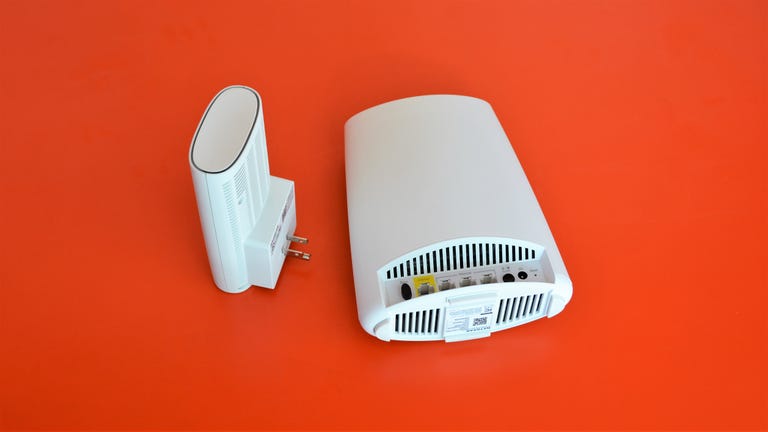 Why You Can Trust CNET
Why You Can Trust CNET Netgear Orbi RBK30 Tri-Band WiFi System review: A Wi-Fi system for homes with plenty of wall sockets
The Negear Orbi RBK30 has no power-line capability but make sure you have plenty of wall sockets around the house if you want to get the most out of it.
At the current cost of $300 (AU$499, £280) for a set of two units (one router, one satellite), the Orbi RBK30 can be a great Wi-Fi system if you live in a house that has a lot of electrical sockets. In many ways, it's just a different flavor of the RBK40.
The Good
The Bad
The Bottom Line
The satellite unit of the RBK30 is very bulky for a wall plug device.
Bulky wall plug design
The RBK30 uses the same router unit (model RBR40) as that of the Orbi RBK40. As a result, it has exactly the same the same feature set, settings, setup process and even similar performance compared to its close sibling. (For this reason, you should check out the review of the RBK40 for more details. This short review will only focused on how this system is different from the rest in Netgear's Orbi family.)
Netgear's Orbi Wi-Fi system family
| Dedicated back-haul speed | 5GHz ceiling speed | 2.4GHz ceiling speed | Wi-Fi standard | Wi-Fi coverage | U.S. price | |
|---|---|---|---|---|---|---|
| Original Orbi (RBK50) | 1,733Mbps | 867 | 400Mbps | AC3000 | 5,000 sq ft | $400 |
| Orbi RBK40 | 867Mbps | 867 | 400Mbps | AC2200 | 4,000 sq ft | $350 |
| Orbi RBK30 | 867Mbps | 867 | 400Mbps | AC2200 | 3,500 sq ft | $300 |
What makes the RBK30 different from its siblings is its satellite unit (model RBW30) which is less than half the size the RBK40's and designed to plug directly into a wall socket. Unfortunately, as a wall plug it's bulky, and will definitely block adjacent sockets.
This design also means you have fewer options in terms of where to place it. Chances are you don't have an available socket at an optimal distance from the router unit. Also keep in mind that since the satellite unit is placed against a wall or in a close quarter, it can't broadcast Wi-Fi signal optimally in all directions.
Good performance
In testing, as expected, the router unit of the RBK40 delivered the same performance as that of the RBK40, topping at more than 400 megabit per seconds. The satellite unit however, was slower than that of the RBK40, with a top sustained Wi-Fi speed of some 240Mbps. Still these were excellent among Wi-Fi systems.
CNET Labs' Wi-Fi system performance.
- Close range
- Long range
In terms of range, the system can easily covered some 3000 square feet of residential setting with the sustained Wi-Fi speed of around 100Mbps. You can adjust the distance between the two units for a larger coverage but that will translate into slower Wi-Fi speed, or you can get an extra satellite unit for $150 which will also work with any existing Orbi system.
Which one should I get?
If you have a moderate broadband connection, any of the Orbi systems will give you the same online experience. That said, if sharing internet is all you care about, the RBK30 will work out just fine, provided you have a wall socket at the right spot. But at the same price, the Google Wifi or the TP-Link Deco M5 will do you well, too.
On the other hand, if you have a very fast broadband connection -- one that's rated at 100Mbp for download or faster -- you want to get the Orbi RBK40 instead, or the Linksys Velop.
And if you want a Wi-Fi system can also deliver fast Wi-Fi speed for heavy local tasks like data sharing or backups, and you don't want run network cables, the RBK50 is the Wi-Fi system to get.



